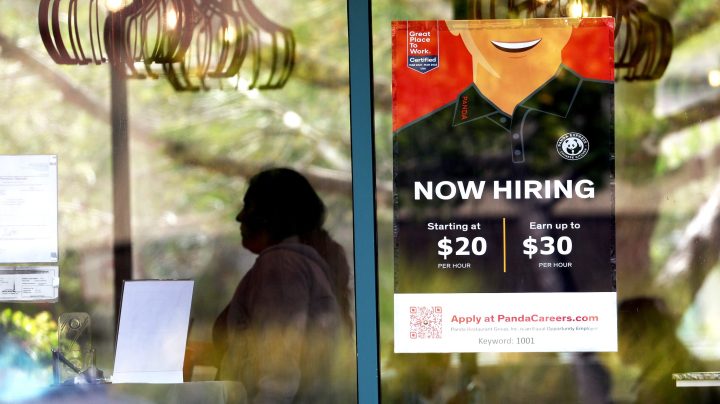
Employment’s back to pre-pandemic levels with more than 500,000 new jobs added in July
Employment’s back to pre-pandemic levels with more than 500,000 new jobs added in July

A whole bunch of jaws hit the floor Friday morning when the Bureau of Labor Statistics released its jobs report for July, because the drumbeat of negative news on the economy — rising interest rates and falling gross domestic product — seemed to be signaling that a weakening job market would come next.
But, wow, was that prediction wrong.
Employers added 528,000 jobs in July — double what economists were expecting — and the unemployment rate fell a tenth of a percent to 3.5%. There were big job gains in leisure and hospitality, health care and retail, but also in construction and finance, which were expected to slow down thanks to rising mortgage rates.
July 2022 will go down in history as the month when the total number of jobs in the economy surpassed the level just before the pandemic hit, in February 2020, and when the unemployment rate finally fell back to its pre-pandemic level.
What’s it all signify?
“Confidence,” said Becky Frankiewicz, president for North America at staffing firm ManpowerGroup. “All of the economic indicators are signaling ‘caution, caution, caution.’ And yet, the American worker and American employers are saying, ‘confidence, confidence, confidence.’”
Frankiewicz said we’re emerging from the pandemic period with consumers still spending it up on goods and services, and employers still trying desperately to hire enough workers to supply them.
And we need all of that to keep going, said Robert Frick at Navy Federal Credit Union, because there’s still more ground to recover.
“Yeah, we’re back to the pre-pandemic level,” he said. “But if you look to the pre-pandemic trend, we’re 4 or 5 million jobs below that.”
That’s because the economy was chugging along in February 2020, and absent COVID-19, it would have added more jobs by now. Going forward, Frick said we’ll need to keep adding jobs.
“Millennials continue to want goods and services, health care needs to rebuild after COVID dropped a bomb on it, child care and day care need to rebuild,” he said.
And in fact, while overall payroll employment is now back to pre-pandemic levels, some sectors are still way behind where they were: leisure and hospitality, for instance, education and government.
And there’s one other key way the economy is different than it was before the pandemic: wage growth.
“So wage growth picked up to 5.2% — a symptom that we still have almost 11 million job openings at a time when businesses were already struggling to hire,” said Mike Fratantoni with the Mortgage Bankers Association.
Before the pandemic, wages were rising just over 3% a year.
There’s a lot happening in the world. Through it all, Marketplace is here for you.
You rely on Marketplace to break down the world’s events and tell you how it affects you in a fact-based, approachable way. We rely on your financial support to keep making that possible.
Your donation today powers the independent journalism that you rely on. For just $5/month, you can help sustain Marketplace so we can keep reporting on the things that matter to you.

















